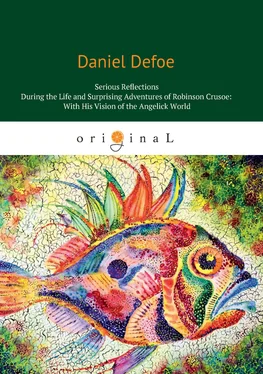Let no man plead he wants retirement, that he loves solitude, but cannot enjoy it because of the embarrassment of the world; ‘tis all a delusion; if he loves it, if he desires it, he may have it when, where, and as often as he pleases, let his hurries, his labours, or his afflictions be what they will; it is not the want of an opportunity for solitude, but the want of a capacity of being solitary, that is the case in all the circumstances of life.
I knew a poor but good man, who, though he was a labourer, was a man of sense and religion, who, being hard at work with some other men removing a great quantity of earth to raise a bank against the side of a pond, was one day so out of himself, and wrapt up in a perfect application of his mind to a very serious subject, that the poor man drove himself and his wheelbarrow into the pond, and could not recover himself till help came to him. This man was certainly capable of a perfect solitude, and perhaps really enjoyed it, for, as I have often heard him say, he lived alone in the world: (1) Had no family to embarrass his affections; (2) his low circumstances placed him below the observation of the upper degrees of mankind; (3) and his reserved meditations placed him above the wicked part, who were those in a sphere equal to himself, among whom, as he said, and is most true, it was very hard to find a sober man, much less a good man; so that he lived really alone in the world, applied himself to labour for his subsistence, had no other business with mankind but for necessaries of life, and conversed in heaven as effectually, and, I believe, every way as divinely, as St. Hilary did in the deserts of Lybia among the lions and crocodiles.
If this retirement, which they call solitude, consisted only of separating the person from the world – that is to say, from human society – it were itself a very mean thing, and would every way as well be supplied by removing from a place where a man is known to a place where he is not known, and there accustom himself to a retired life, making no new acquaintance, and only making the use of mankind which I have already spoken of, namely, for convenience and supply of necessary food; and I think of the two that such a man, or a man so retired, may have more opportunity to be an entire recluse, and may enjoy more real solitude than a man in a desert. For example: –
In the solitude I speak of, a man has no more to do for the necessaries of life than to receive them from the hands of those that are to furnish them, and pay them for so doing; whereas in the solitude of deserts and wandering lives, from whence all our monkish devotion springs, they had every day their food, such as it was, to seek, or the load of it to carry, and except where, as is said, they put Providence to the operation of a miracle to furnish it, they had frequently difficulties enough to sustain life; and if we may believe history, many of them were starved to death for mere hunger or thirst, and as often the latter as the former.
Those that had recourse to these solitudes merely as a mortification of their bodies, as I observed before, and delivering themselves from the temptations which society exposed them to, had more room for the pretence, indeed, than those who allege that they did it to give up themselves to prayer and meditation. The first might have some reason in nature for the fact, as men’s tempers and constitutions might lead; some having an inordinate appetite to crime, some addicted by nature to one ill habit, some to another, though the Christian religion does not guide us to those methods of putting a force upon our bodies to subdue the violence of inordinate appetite. The blessed apostle St. Paul seems to have been in this circumstance when being assaulted with what is called in the text “ a thorn in the flesh; “ be it what it will that is meant there, it is not to my purpose, but he prayed to the Lord thrice; that was the first method the apostle took, and thereby set a pious example to all those who are assaulted by any temptation. He did not immediately fly to austerities and bodily modifications, separating himself from mankind, or flying into the desert to give himself up to fasting, and a retreat from the world, which is the object of all private snare, but he applied himself by serious prayer to Him who had taught us to pray, “Lead us not into temptation.” And the answer likewise is instructing in the case; he was not driven out as Nebuchadnezzar into the desert – he was not commanded to retire into the wilderness that he might be free from the temptation; nothing less; but the answer was, “My grace is sufficient for thee” – sufficient without the help of artificial mortification.
So that even in the case of these forcible mortifications they are not required, much less directed, for helps to meditation; for if meditation could not be practised beneficially, and to all the intents and purposes for which it was ordained a duty, without flying from the face of human society, the life of man would be very unhappy.
But doubtless the contrary is evident, and all the parts of a complete solitude are to be as effectually enjoyed, if we please, and sufficient grace assisting, even in the most populous cities, among the hurries of conversation and gallantry of a court, or the noise and business of a camp, as in the deserts of Arabia and Lybia, or in the desolate life of an uninhabited island.
Chapter Two. An Essay Upon Honesty
When I first came home to my own country, and began to sit down and look back upon the past circumstances of my wandering state, as you will in charity suppose I could not but do very often, the very prosperity I enjoyed led me most naturally to reflect upon the particular steps by which I arrived to it. The condition I was in was very happy, speaking of human felicity; the former captivity I had suffered made my liberty sweeter to me; and to find myself jumped into easy circumstances at once, from a condition below the common rate of life, made it still sweeter.
One time as I was upon my inquiries into the happy concurrence of the causes which had brought the event of my prosperity to pass, as an effect, it occurred to my thoughts how much of it all depended, under the disposition of Providence, upon the principle of honesty which I met with in almost all the people whom it was my lot to be concerned with in my private and particular affairs; and I that had met with such extraordinary instances of the knavery and villainy of men’s natures in other circumstances, could not but be something taken up with the miracles of honesty that I had met with among the several people I had had to do with, I mean, those whom I had more particularly to do with in the articles of my liberty, estate, or effects, which fell into their hands.
I began with my most trusty and faithful widow, the captain’s wife with whom I first went to the coast of Africa, and to whom I entrusted £200, being the gain I had made in my first adventures to Guinea, as in the first volume, page 18, appears.
She was left a widow, and in but indifferent circumstances; but when I sent to her so far off as the Brazils, where I was in such a condition as she might have reasonably believed I should never have been able to come myself, and if I had, might be in no condition to recover it of her, and having myself nothing to show under her hand for the trust, yet she was so just that she sent the full value of what I wrote for, being £100; and to show, as far as in her lay, her sincere honest concern for my good, put in among many necessary things which I did not write for, I say, put in two Bibles, besides other good books, for my reading and instruction, as she said afterwards, in Popish and heathen countries, where I might chance to fall. Honesty not only leads to discharge every debt and every trust to our neighbour, so far as it is justly to be demanded, but an honest man acknowledges himself debtor to all mankind, for so much good to be done for them, whether for soul or body, as Providence puts an opportunity into his hands to do. In order to discharge this debt, he studies continually for opportunity to do all the acts of kindness and beneficence that is possible for him to do; and though very few consider it, a man is not a completely honest man that does not do this.
Читать дальше











